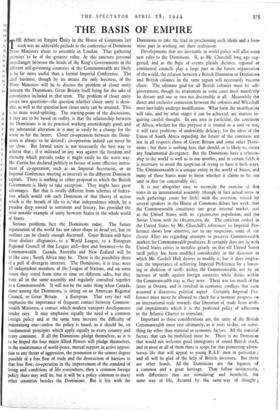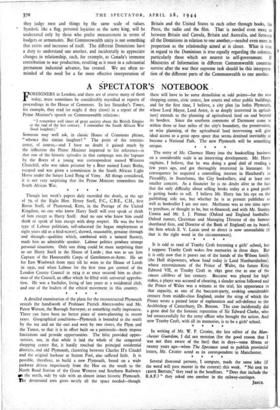THE BASIS OF EMPIRE
THE debate on Empire unity in the House of Commons last week was an admirable prelude to the conference of Dominion Prime Ministers about to assemble in London. That gathering promises to be of the- greatest value. At this juncture personal interchanges between the heads of the King's Governments in the different self-governing countries of the Commonwealth are likely to be far more useful than a formal Imperial Conference. The chief business, though by no means the only business, of the Prime Ministers will be to discuss the problem of closer unity between the Dominions, Great Britain itself being for the sake of convenience included in that term. The problem of closer unity covers two questions—the question whether closer unity is desir- able, as well as the question how closer unity can be attained. This is no mere word-splitting. The starting-point of the discussions, if they are to be based on reality, is that the relationship between the Dominions is in its practical working astonishingly good, and any substantial alteration in it may as easily be a change for the worse as for the better. Closer co-operation between the Domi- nions is always to be desired ; co-operation indeed can never be too close. But formal unity is not necessarily the best way to achieve that ; if it militated in,any way against the freedom and elasticity which prevails today it might easily be the worst way. Mr. Curtin has declared. publicly in favour of some effective instru- ment of co-operation, such as an Imperial Secretariat, or an Imperial Conference meeting at intervals in the different Dominion capitals. There is nothing in either proposal to which the British Government is likely to take exception. They might have great advantages. But that is totally different from schemes of federa- tion which would rob' each Dominion of that liberty of action which is the breath of life to it, that independence which, by a paradox deep rooted in sentiment and history, has provided the most notable example of unity between States in the whole world of States. .
Serious problems face the Dominions today. The future organisation of the world has not taken shape in detail yet, but its outlines can be clearly enough discerned. Great Britain will have three distinct allegiances, to a World Uague, to a European Regional Council of that League and=first and foremost—to the Commonwealth. Canada, Australia and New Zealand will be in like case ; South Africa may be. There is the possibility there of a pull of divergent interests. The Dominions, it is true, were all independent members of the League of Nations, and on some issues they voted from time to time on different sides, but they were all in the same-assembly and regularly consulted together as a Commonwealth. It will not be the same thing when Canada, alone among the Dominions, is sitting on an American Regional Council, or Great Britain a European. That very fact will emphasise the importance of frequent contact between Common- wealth Ministers, a contact which modern transport developments render easy. It may emphasise equally the need of a common foreign policy and at the same time increase the difficulty of maintaining one—unless the policy is based, as it should be, on fundamental principles which apply equally to every country and every continent. If all the Dominions pledge themselves, as it is to be laved the four major Allied Powers will pledge themselves, to the maintenance of world-peace, mutual support in active opposi- tion to any threat of aggression, the promotion to the utmost degree possible of a free flow of trade and the destruction of barriers to ffiat free flow, co-operation in the improvement of the standard of living and conditions of life everywhere, then a common foreign policy there may well be, but it will be a, policy common to many other countries besides the Dominions. But it lies with the Dominions to take the lead in proclaiming iuch ideals and a fore- most part in working out their realisation.
Developments that are inevitable in world-policy will allot some new roles to the Dominions. If, as Mr. Churchill long ago sug- gested, and as the logic of events plainly dictates, regional or continental councils play a large part in the future organisation of the world, the relation betvkeen a British Dominion or Dominions and British colonies in the same region will necessarily become closer. The ultimate goal for all British colonies must be self- government, though its attainment in some cases must manifestly be distant and one or two not discernible at all. Meanwhile the direct and exclusive connexion between the colonies and Whitehall must inevitably undergo modification. What form the modification will take, and by what stages it can be achieved, are matters re- quiring careful thought. In one area in partictilar, the continent of Africa, whether for this purpose it is treated as a unit or not, it will raise problems of undeniable delicacy, for the ideas' of the Union of South Africa regarding the future of the continent are not in all respects those of Great Britain and some other Domi- nions ; but there is nothing here that should, or is likely to, create any fundamental divergence. But the Dominions have a relation- ship to the world as well as to one another, and in certain fields it is necessary to avoid the suspicion of trying to have it both ways. The Commonwealth is a unique entity in the world of States, and many of those States want to know whether it claims to be one unit or five (or conceivably six).
It is not altogether easy to reconcile the exercise of five votes in an international assembly (though in fact actual votes in such gatherings count for little) with the assertion, voiced by several speakers in the House of Commons debate last week, that the Commonwealth constitutes one great internal market, just as the United States with its t3o,000,000 population, and the Soviet Union with its 18o,o0o,000, do. The criticism evoked in the United States by Mr. Churchill's references to Imperial Pre- ference shows how sensitive, not to say suspicious, some of our closest Allies are regarding attempts to preserve Commonwealth markets for Commonwealth producers. It certainly does not lie with United States critics to moralise greatly on that till United States tariff policy has been modified considerably in the direction in which Mr. Cordell Hull desires to modify it, but it does empha- sise the importance of achieving Imperial Preference by a lower- ing or abolition of tariffs within the Commonwealth, not by an increase of tariffs against foreign countries while duties within the Commonwealth stay as they were. There was too much of the latter at Ottawa, and it resulted in economic conflicts that soon assumed a disastrous political aspect Certainly Imperial Pre- ference must never be allowed to check for a moment progress on an international scale towards that' liberation of trade from artifi- cial impediments which it is the professed policy of adherents to the Atlantic Charter to stimulite.
Important as those considerations are, the unity of the British Commonwealth must rest ultimately, as it rests to-day, on some- thing far other than material or economic factors. All the material factors that can be mobilised must be. There is no Dominion that would not welcome good immigrants of sound British stock, and in most or all of them there is scope for that pioneering adven- turous life that will appeal to young R.A.F. men in particular ; and all will be glad of the help of British investors. But there are other bonds. All the Dominions are the legatees of a common and a great heritage. They follow instinctively, with differences that are stimulating and beneficial, the same way of life, dictated by the same way of thought ; they judge men and things by the same scale of values. Symbols like a flag, personal loyalties to the same king, will be underrated only by those who prefer measurement in terms of budgets or armaments. But Commonwealth unity is not something that exists and increases of itself. The different Dominions have a duty to understand one another, and incidentally to appreciate changes in relationship, such, for example, as Canada's immense contribution to war production, resulting as it must in a substantial permanent industrial advance, has created. We are often re- minded of the need for a far more effective interpretation of Britain and the United States to each other through books, the Press, the radio and the film. That is needed even more as between Britain and Canada, Britain and Australia, and Between all the Dominions in relation to one another,—needed even more in proportion as the relationship aimed at is closer. What is true in regard to the Dominions is true equally regarding the colonies, particularly those which are nearest to self-government. If Ministries of Information in different Commonwealth countries survive after the war their supreme task should be this interpreta- tion of the different parts of the Commonwealth to one another.



























 Previous page
Previous page